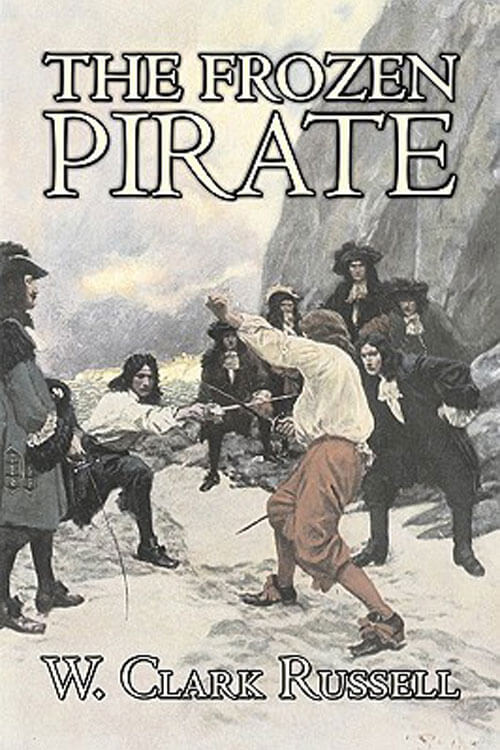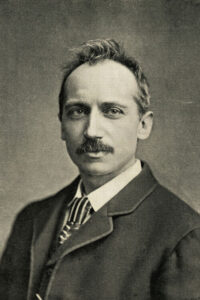
The Frozen Pirate
I knew enough of his language to let me know he spoke in French, but that was all. I could not say a syllable of that tongue.
“You’ll be feeling better presently; you must not expect your strength to come in a minute,” said I, taking my chance of his understanding me and speaking that he might not think me a ghost, for I doubt not I was as white as one; since to be plain, the mere talking to a figure that I had got to consider as sheerly dead as anybody in a graveyard was alarming enough, and then again there was the sound of my voice, which I had not exerted in speech for ages, as it seemed to me.
He faintly nodded his head, which I perceived meant he understood me, and said very faintly in English but with a true French accent, “This is a hard bed, sir.”
“I’ll speedily mend that,” said I, and at once fetched a mattress from the cabin next to mine; this I placed beside him and dragged him onto it, he very weakly assisting. I then brought clothes and rugs to cover him with and made him a high pillow, and as he lay close to the furnace, he could not have been snugger had he had a wife to tuck him up in his own bed.
Read or download Book
W. Clark Russell
William Clark Russell (24 February 1844 – 8 November 1911) was an English writer best known for his nautical novels.
Biography.
At 13, Russell joined the United Kingdom’s Merchant Navy, serving for eight years. Life’s hardships at sea permanently damaged his health but provided him with material for a writing career. He wrote short stories, press articles, historical essays, biographies, and a book of verse, but he was known best for his novels, most of which were about life at sea. He maintained a simultaneous journalism career, principally as a columnist on nautical subjects for The Daily Telegraph.
Russell campaigned for better conditions for merchant seamen, and his work influenced reforms approved by Parliament to prevent unscrupulous ship-owners from exploiting their crews. The future King George V. acknowledged his influence in this respect. Russell’s contemporary admirers were Herman Melville, Algernon Swinburne, and Sir Arthur Conan Doyle.
Career
Journalism
Russell had an office job with a commercial company for a few months, after which he decided to attempt a literary career. His first attempt was a five-act tragedy, Fra Angelico, which was staged unsuccessfully in London in 1866. At the same time, he began work as a journalist to provide a stable income for himself and his family. In 1868, he started his journalism career and was the editor for The Leader for a brief period until 1871 when he joined the Kent County News. During the next two decades, he wrote for various newspapers, including The Newcastle Daily Chronicle, The Kent County News, and most importantly for him, The Daily Telegraph, for which he wrote articles for about seven years using the pseudonym “Seafarer”.
Writer
There is much confusion around Russell’s career, possibly due to his writings being published anonymously or under various pseudonyms, so much so that even his immediate family were unaware of the full extent of his writings. From the early 1870s, Russell published novels using various pseudonyms (Sydney Mostyn, Eliza Rhyl Davies, and Philip Sheldon) with modest success. According to Andrew Nash, the adoption of the more feminine pseudonyms “arose from his perception of the novel as a feminized form and novel-reading as predominantly a female activity.” Adopting many feminine pseudonyms in his early works resulted from the Victorian-era belief that specific genres were destined only for certain genders. His early attempts at novels set on land only proved to be a failure, obscured by the nautical novels that had established him as a master of the niche during his time. In conjunction, his poetic and artistic prose and description of the sea facilitated his literary success.
The stories of an old seaman at Ramsgate gave him the idea of writing about life at sea, drawing on his own experience. An obituarist of Russell wrote that since the heyday of such writers as Captain Marryat, Michael Scott and Frederick Chamier some thirty or forty years before, “no one in this country had written of the sea from actual knowledge”. As Richard D. Graham notes in Masters of Victorian Literature, 1837-1897, “Of living authors, William Clark Russell (1844) is the true successor of Marryat, and may even be said to excel the older writer in the power with which he has described the cruel mystery of the sea, its dangers, and the crimes and superstitions of the men who do business upon it”.
Later years
During his last two decades, Russell became progressively more disabled by arthritis, generally regarded as a legacy of his years at sea as a youth – “the sailor’s enemy”, as The Manchester Guardian stated. He did not allow this to stop him from writing; The Times commented, “He worked harder than many haler men.” He went to health resorts, including Bath, Droitwich and Madeira, and after living in Ramsgate and Deal on the south coast of England, he settled in Bath. He was bedridden for the last six months of his life.






